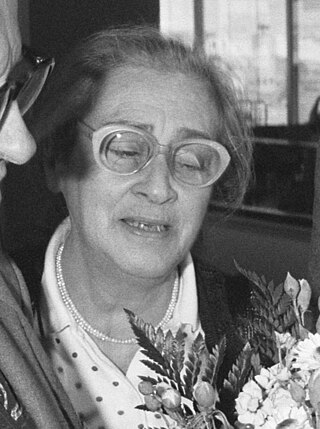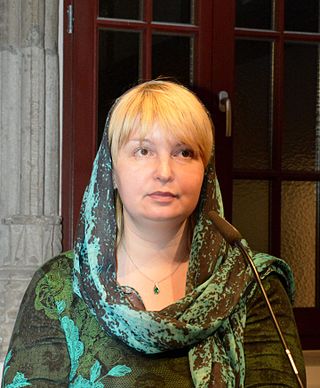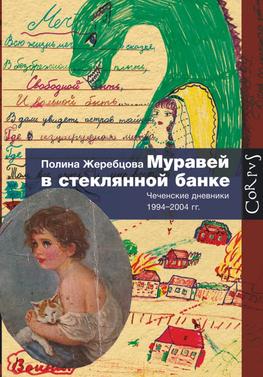Yelena Maglevannaya (Russian : Елена Маглеванная, born 15 December 1981) is a Russian free-lance journalist for the newspaper Svobodnoye Slovo, Free Speech, in Volgograd. She requested a political asylum in Finland in May 2009. [1] [2] Maglevannaya has focused on cases of persecution against Chechens. [3] [4]
Maglevannaya published an article of a Chechen Zubayr Zubayraev (Russian : Зубайр Зубайраев), detained in Volgograd since 2007, in Civitas.ru, Svobodnoye Slovo and later on the web page of the Islamic Committee of Russia. The article criticized the conditions and ill-treatments in prisons. On 18 February 2009, the administration of Volgograd set a suit against Maglevannaya for “honour and business reputation protection”, accusing her of spreading disinformation on torture of Mr. Zubayraev. Court of Volgograd ruled that Maglevannaya had spread false information, and ordered to pay 200,000 rubles (about 4,600 euros) as a compensation for moral damage to the administration of Volgograd prison colony LIU-15. [1] [2] [5]
Also, Maglevannaya has received a death threat on the web site of a nationalist group Russian Nationwide Union. [1] Maglevannaya claims that she was threatened to be sent to a mental hospital if she continued to write. [6]
In Finland, Maglevannaya has been supported by members of the "Finnish-Russian Civic Forum" (Finrosforum). [7] In May 2009, Maglevannaya participated in a forum on human rights by Finrosforum in Helsinki and requested for a political asylum a few days later. [1] [3] In 2010, she was granted political asylum in Finland. [7]

Russia has consistently been criticized by international organizations and independent domestic media outlets for human rights violations. Some of the most commonly cited violations include deaths in custody, the systemic and widespread use of torture by security forces and prison guards, the existence of hazing rituals within the Russian Army—referred to as dedovshchina —as well as prevalent breaches of children's rights, instances of violence and prejudice against ethnic minorities, and the targeted killings of journalists.

Yelena Georgiyevna Bonner was a human rights activist in the former Soviet Union and wife of the physicist Andrei Sakharov. During her decades as a dissident, Bonner was noted for her characteristic blunt honesty and courage.
Black sites are clandestine detention centers operated by a state where prisoners who have not been charged with a crime are incarcerated without due process or court order, are often mistreated and murdered, and have no recourse to bail.

On 7 October 2006, Russian journalist, writer and human rights activist Anna Politkovskaya was shot dead in the elevator of her apartment block in central Moscow. She was known for her opposition to the Chechen conflict and for criticism of Vladimir Putin. She authored several books about the Chechen wars, as well as Putin's Russia, and received several international awards for her work. Her murder, believed to be a contract killing, sparked a strong international reaction. Three Chechens were arrested for the murder, but were acquitted. The verdict was overturned by the Supreme Court of Russia and new trials were held. In total, six people were convicted of charges related to her death.

Arbi Alautdinovich Barayev was a Chechen warlord who in 1996 became the founder and first leader of the Special Purpose Islamic Regiment (SPIR) in Chechnya.
Boris Vladimirovich Stomakhin is a Russian radical political activist, and editor of "Radical politics" periodical. He was convicted three times for hate speech, incriminating him advocating a dismemberment of the Russian Federation and inciting ethnic and religious hatred, and justification of terrorism. The convictions have been questioned by human rights organizations ARTICLE 19, Committee to Protect Journalists, and Union of Councils for Soviet Jews.
Yelena Tregubova is a Russian journalist. Her book The Tales of a Kremlin Digger detailed her work in the Kremlin pool.
Since the start of the Second Chechen War in 1999, Russian federal authorities are alleged to have implemented a plan to use legal and extralegal methods to limit media access to the conflict region.
Fatima Tlis or Tlisova is a Russian-American investigative journalist, researcher and expert on Russia.
Murat Gasaev, was a Russian refugee in Spain. An ethnic Chechen from the Republic of Ingushetia, he was extradited to Russia in December 2008 despite protests by human rights organizations including Amnesty International and Human Rights Watch. It was feared that Gasaev might be at risk of torture and ill-treatment, as well as the denial of a fair trial due to the potential use of evidence extracted under torture in Russia.
Umar Sharpuddievich Israilov was a former bodyguard of Chechen President Ramzan Kadyrov who became a critic of the Chechen government. He was shot and killed in exile in Vienna, Austria on January 13, 2009.
The Russian LGBT Network is a non-governmental LGBT rights organization working for the social acceptance of and protection of the rights of LGBT people in Russia. Founded in 2006, it was reformed into the first Russian inter-regional LGBT rights organization on October 19, 2008. The organization is a member of the International Lesbian and Gay Association (ILGA) and is led by Russian LGBT rights activist Igor Kochetkov.

Elena Valeryevna Milashina is a Russian investigative journalist for Novaya Gazeta. She has received multiple awards for her work.
Yelena or Jelena is a feminine given name. It is the Russian form of Helen, written Елена in Russian.

Polina Zherebtsova's Journal: Chechnya 1999-2002 is the edited diary kept by Polina Zherebtsova while she was living in Grozny, the capital of the Chechen Republic. It was published in September 2011 in Russia. Zherebtsova wrote the diary when she was 14–17 years old, from the beginning of The Second Chechen War until December 2002. It tells the story of ethnic relations between Russian and Chechen peoples and of the lives of civilians during the war. This book is non-fiction, but real names were changed by the author in the book.

Polina Zherebtsova is a Chechen Russian documentarian, poet and author of the diaries Ant in a Glass Jar, covering her childhood, adolescence and youth that witnessed two Chechen wars.
The Bolotnaya Square case is a criminal case by the Investigative Committee of the Russian Federation on account of alleged mass riots and alleged violence against the police during the "March of the Millions" on May 6, 2012 on the Bolotnaya Square in Moscow. The demonstration was one of the biggest protests in Russia since the 1990s. By the number of accused, 37 persons, it is currently the largest criminal case against participants of public demonstrations in modern Russia.

Ant in a Glass Jar: Chechen Diaries 1994–2004 (Russian: "Муравей в стеклянной банке. Чеченские дневники 1994–2004" is a 2014 documentary book that is an author's diary about the years spent in Chechnya from 1994 until 2004. It was written by Polina Zherebtsova, while she was 9–19 years old.

Rauf Habibulla oghlu Mirgadirov is an Azerbaijani columnist and journalist. He has worked for the Baku based Russian-language newspaper Zerkalo. A believer in "citizen diplomacy" between Armenia and Azerbaijan over the Nagorno-Karabakh conflict, Mirgadirov was arrested for allegedly spying for Armenia and has been detained since April 2014. In December 2015, he was found guilty and sentenced to six years of prison. Following an appeal of his case, the ruling was upheld in March 2016, but Mirgadirov was released on suspended sentence.

Anti-gay purges in Chechnya, a part of the Russian Federation, have included forced disappearances, secret abductions, imprisonment, torture and extrajudicial killing by authorities targeting persons based on their perceived sexual orientation, primarily gay men. At least 2 of the 100 people, whom authorities detained on suspicion of being gay or bisexual, have reportedly died after being held in what human rights groups and eyewitnesses have called concentration camps.